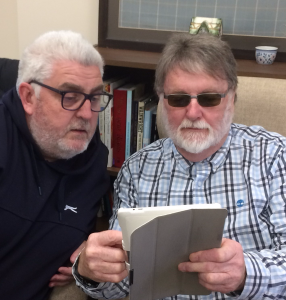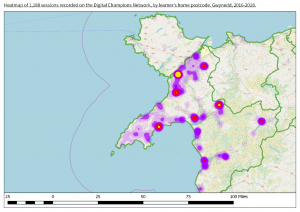Gwynedd – supporting digital skills in a rural area
Published by Kate Gallant on
Having lived and worked in rural areas over the last fifteen years, I have a good understanding of what the barriers to inclusion and participation are – particularly slower connectivity, lower skills levels and a decline in rural bus services. Gwynedd has reasonable levels of employment but incomes are considerably lower than Welsh averages. As with many rural areas the level of deprivation linked to accessing services is high for a large majority of the area. As a result being able to access services online has become even more critical for local people.
The project has been involved in training staff who provide local services to become Digital Champions, it also employs two professional Champions – Medwyn and Rachel – who deliver digital skills support across the County.
Digital skills drop-in sessions are offered in rural areas using local village halls and other community venues, sessions are also available in local libraries. Medwyn told me how the project is better able to attract people if a local person supports and publicises the opportunity. Most halls have Wi-Fi available but if the hall is not regularly open this can limit access for those on lower income who may be struggling with the costs of connectivity. Funding has recently been secured by the Council to provide service kiosks in 12 rural areas which will support access to local services.
Local people are coming forward for support for many reasons – wanting to book GP appointments online, access online food shopping or online banking – especially with reductions in local face to face banking services.
To be successful, and deliver support to larger groups of people, often the Champions go through a two stage process of collecting interest and then forming people into groups based on their locations. This is more sustainable and makes the best use of available resources. Over the summer the team have been out visiting local community events – interest from these areas will then allow a programme of skills support to be planned during the autumn. Local community groups for instance, lunch clubs for older people also provide an opportunity to offer a series of skills support sessions.
This heatmap shows where the project has provided support and demonstrates how the project is reaching out into rural areas (as well as targeting activity in areas of greater population density).
It was great to see the depth of understanding and knowledge there is within the project, of the needs within individual villages and local communities. This flexible approach, providing targeted digital skills support, reduces the impact of rural barriers which otherwise can lead to low confidence and lack of motivation among learners.

